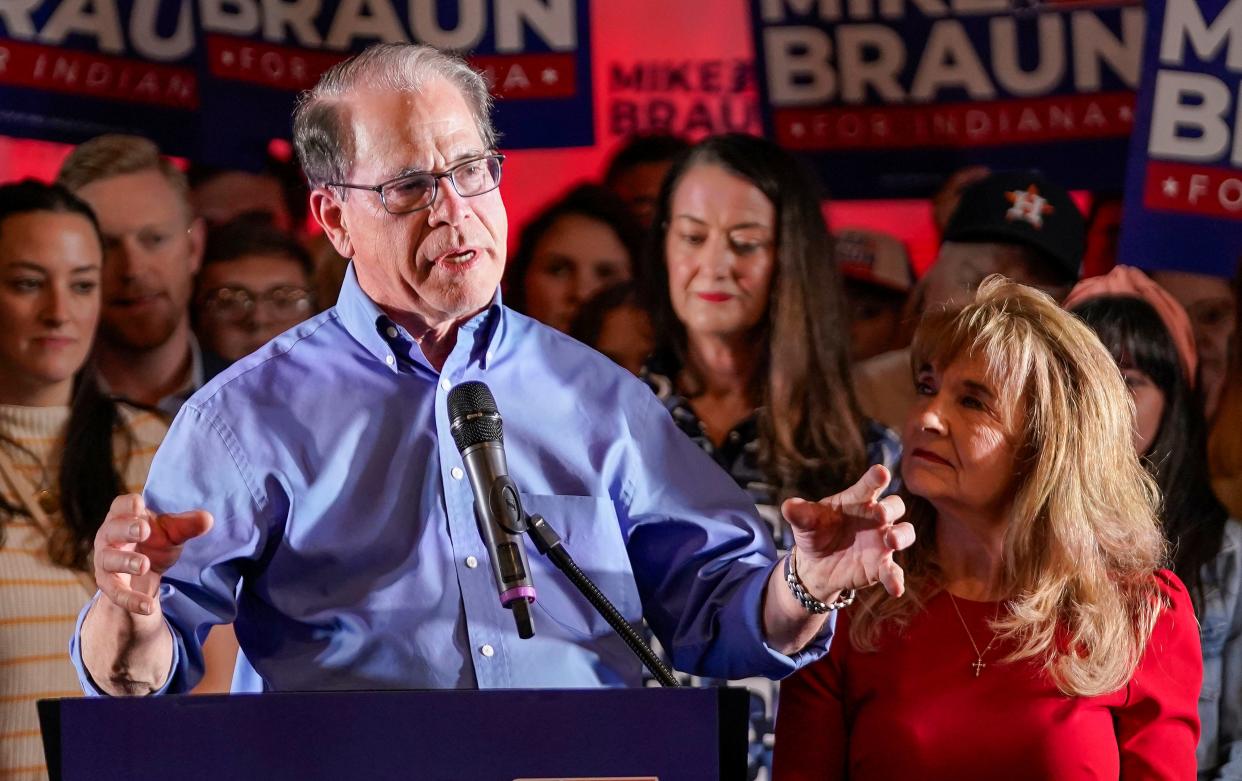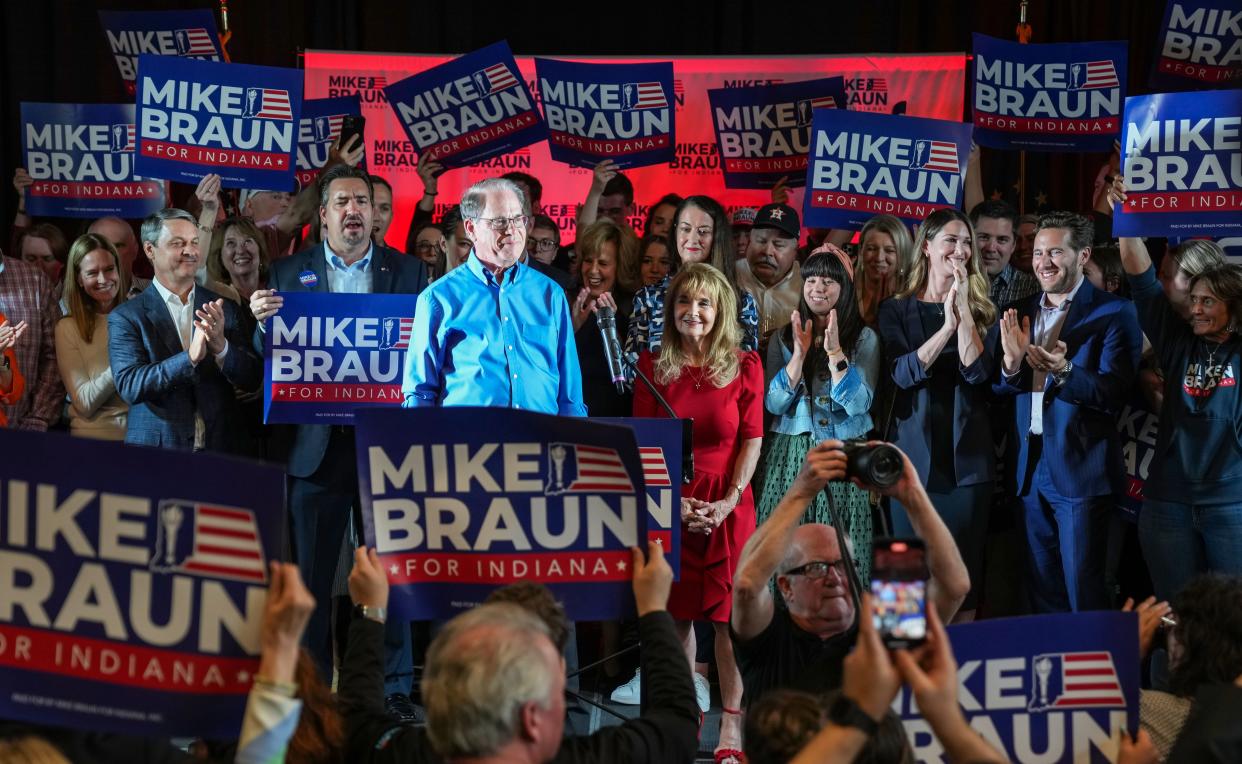Claybourn: The GOP's shift in the Hoosier heartland
As Mike Braun clinched the GOP gubernatorial nomination in Indiana, we became not just observers of a political spectacle but also witnesses to a profound transformation within the Republican Party − a shift that marks a departure from Hoosier practicality to an era dominated by national identity.
This year's primary illustrates a seismic shift within the GOP, one that transcends mere political strategies to touch the core of personal allegiance. Under the looming influence of Donald Trump, the party has adopted a politics that prioritizes identity, loyalty, and theatrics.
It directly appeals to a base that feels besieged, misunderstood, and neglected by conventional political elites. It’s a politics of gut feeling, of friend versus foe, of us against them. It is, at its core, a reactive movement − reactive against a rapidly changing world that many feel ignores them.
Beyond Indianapolis, Indiana's landscape reflects this populist trend. Figures such as Mike Braun and Suzanne Crouch, despite their wealth and political tenure, manage to embody an authentic connection thanks in part to their Southwestern Indiana roots. In places like Jasper and Evansville, their hometowns, community bonds keep egos in check and require you to roll up your sleeves − literally.
Contrast this with Eric Doden and Brad Chambers, who both seem more at home in a board room or country club. Since 2016, the political elite in Indianapolis have struggled to engage the party’s populist wing, often missing opportunities to connect.
Instead of embracing grassroots events like tractor pulls at the Putnam County Fair, they seem to prefer engineering and law firm mixers, distancing themselves from core supporters.

The political divide is further exacerbated by GOP infighting, more pronounced now than it has been in generations. Governor Eric Holcomb seemed detached from his logical successor, Crouch, and Kyle Hupfer, the state party chair, accused her of creating a “toxic” dynamic in the party.
This internal discord underscores a broader struggle within the party to reconcile its emerging populist faction with its traditional establishment − both seemingly at odds with one another.
As we gaze upon this unfolding narrative, it becomes clear that the GOP’s embrace of populism is less a momentary lapse and more a reinvention. The party’s new establishment, MAGA Trumpists, seek not only to rally the disaffected but also to redefine what it means to be a conservative in the modern age.
It is a bold, albeit risky, gambit that trades the certainties of traditional governance for the allure of charismatic leadership and visceral appeal. The question remains, however: can this new identity sustain itself without sacrificing the intellectual and moral foundations upon which the party was built?
As the party charts this tumultuous course, it must confront the reality that while emotional resonance can win elections, it may not always govern effectively.
In Indiana, as in much of America, politics has become less about policies and more about the vibes one exudes. This emotional and identity-driven approach has sidelined traditional conservative principles such as fiscal restraint, individual freedoms, and a minimized government footprint.

Amidst this transformation, figures like former Vice President Mike Pence and Senator Todd Young have cautiously navigated the Trumpian waters, neither fully embracing nor outright rejecting his influence.
This delicate balance reflects the broader challenges facing the party, as it grapples with an identity crisis that could alienate a swath of voters uncomfortable with its increasingly abrasive tactics.
It’s telling that John Hammond III, an Indiana RNC Committeeman, decided to step down and critique the party. Hammond, representing an older, consensus-driven style of leadership, seems out of place in today's polarized climate. His departure is not just a personal decision but a canary in the coal mine for those who still hope for a return to a more traditional, inclusive Republicanism.
This shift underscores a significant transformation within the GOP, which now seems intent on emphasizing national issues and identity politics. Such a strategy, while potentially energizing a passionate base, risks alienating a broader electorate uncomfortable with the abrasive and divisive tactics these politics often entail.
Looking ahead, the GOP faces a dilemma: can it harmonize these divergent forces, or will it succumb to the prevailing winds of populism and identity politics?
The resolution of this tension will not only shape the future of the Republican Party but also define the very nature of governance in America at a time when the stakes are profoundly high.
Joshua Claybourn is an attorney and author in Evansville. Find him online at JoshuaClaybourn.com.
This article originally appeared on Evansville Courier & Press: Claybourn: The GOP's shift in the Hoosier heartland
